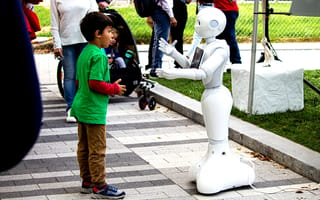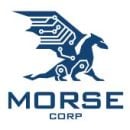The robots are here. The longtime science fiction film staples are becoming a reality thanks to the booming robotics industry, which is using artificial intelligence to revolutionize a plethora of industries. With the close proximity of MIT, Boston has become a hot spot for robot tech. These Boston robotics companies, where engineers, data scientists and all in-between, have a hand in innovating everything from agriculture to surgery.
Boston Robotics Companies You Should Know
- RightHand Robotics
- Veo Robotics
- Boston Dynamics
- Neurala
- Rethink Robotics
- iRobot
- Harvest Automation
- Sea Machines Robotics
SharkNinja is known for holding over 3,000 patents and getting new products to market quickly. Though the company has a global presence, Shark is based in Boston where it designs and manufactures a line of robot vacuum cleaners. These robot vacuums are designed for a variety of everyday uses including self-emptying and two-in-one vacuum/mop robots.
What they do: MORSE develops tech for U.S. national security interests. Staffed by scientists, engineers and software developers, the company has worked on various robotics systems and technology. Such projects have included upgrading an airdrop system that precisely drops food, water and weapons ammunition supplies for military forces. The company relies on a user-centered development process to ensure its work is tailored to meet the client’s specific needs and has been tested under “operationally representative conditions.”
Piaggio Fast Forward builds tech-enabled mobility solutions and robotics designed to help users move themselves and their cargo more freely. Piaggio's first product is a mobile-carrier that can tote items up to 45lbs, following users around to keep them effortlessly mobile and their hands free.
Veo Robotics creates transformative products for manufacturing robots. Their technology uses computer vision, AI and 3D sensing for more productive and efficient robots. Veo’s products enable robots to be more flexible and work more collaboratively with people.
Righthand Robotics creates adaptable robots that ultimately reduce the e-commerce costs of order fulfillment. The machines are best described as “pickers” because they mainly perform tasks like selecting and sorting items ranging from bars of soap to electronics. Different than most factory and assembly line robots, RHR solutions are easy to setup, adaptable and able to perform multiple tasks.
Superpedestrian’s team of designers and engineers are in the business of enhancing urban mobility. With an exclusive license to MIT’s Copenhagen Wheel, the company is mass producing the semi-autonomous robotic bicycle wheel. The Copenhagen Wheel changes the experience of riding a bike, ultimately making it more efficient. The wheel learns how the user rides, amplifies their pedal power, has regenerative braking abilities and even connects to smartphones for ride analysis.
Vecna develops robots for multiple industries, including healthcare, fulfillment, manufacturing, warehousing, hospitality and more. One of their feature products, VGO, is a completely remote-controlled device that gives users the ability to see, hear and interact in a situation without actually being there. It’s used in healthcare, education and enterprise business.
Takeoff Technologies is working to change grocery shopping through automated micro-fulfillment centers, utilizing robotics to select items and fulfill orders quickly. Takeoff’s automation integrates into a businesses’ existing system and their end-to-end solution offers grocery retailers the tools they need to thrive in a digital market.
Root’s platform resides somewhere between robotics, gaming and education. Boasting an innovative interface for immersing children in coding languages, Root enables users as young as four to bring code to life. Root goes beyond other code-learning systems featuring a robot that seamlessly draws out what a student is building in the platform.
Located in North Billerica, Alert Innovation is a growing startup changing the future of retail through robotics. The company’s first product, Alphabot, is a mobile robot with three dimensional movement capabilities. The robot was designed to perform automated storage and retrieval at fulfillment centers, simplifying the retail process.
Boston Dynamics is a perfect example of robot creations you might expect to see in a sci-fi film. A subsidiary of Google, the company builds robots with sensor-based controls that respond to stimuli and can be incredibly fast and agile. Some of the most prominent organizations in the world, such as DARPA, Sony and the United States military, have made Boston Dynamics their go-to place for innovative robots.
Formerly Kiva Systems, Amazon Robotics is an owned subsidiary of Amazon.com. The e-commerce giant is developing robotics technology to automate its fulfillment center operations. This branch of Amazon is focused on continuing research and development to discover new opportunities for extending their products into untapped areas. In other words, the sky's the limit.
Neurala are the makers behind “The Neurala Brain,” a deep learning neural network software that makes robots, drones, cameras and self-driving cars autonomous, smarter and more useful. Neurala's first project was developed for NASA for use in autonomous planetary exploration. At the time, supercomputers and a reliable, fast internet connection were not options, so Neurala built its brain software. The approach was so successful the company is now bringing the technology to market.
Rethink Robotics creates manufacturing robots to automate processes that have traditionally been more cost-effective perform manually. Its models optimize labor in numerous industries, including automotive, consumer goods, plastics and electronics. Rethink enables companies to lower their costs and invest in more skilled labor. Its robots are easily trained by human counterparts, making them more safe and dependable in the workplace.
Symbotic uses robotics to increase supply chain efficiency by providing flexible network automation solutions for distribution centers and warehouses. The company has both fully-automated and semi-automated solutions, including robots that can access any case at any time at speeds up to 25 mph. Its systems are flexible and installed based on the clients existing warehouse layout and needs.
A little different than the typical robotics company, Artaic uses automation to design and create mosaics for the architecture and interior design industry. The company robotics to make a very expensive and time consuming art form more accessible.
Harvest Automation designs and manufactures robots that are used for agriculture distribution and fulfillment. The robots not only cut down on production costs, they can also increase overall productivity and even plant quality. Born out of a need to tackle labor scarcity issues, Harvest has created the opportunity for growers to have a sustainable automated workforce that can work safely alongside real people.
iRobot is most widely known for Roomba, the tiny robot vacuum that keeps your house tidy. In addition to their autonomous vacuums, the company offers multiple cleaning solutions that operate with artificial intelligence. iRobot frees people from the tyranny of everyday mundane tasks, and that's proved a big hit in the marketplace — the company has sold more than 15 million robots worldwide.
Sea Machines develops autonomous control and remote command systems to streamline the operations of marine vessels. Currently conducting their trials in the Boston Harbor, Sea Machines is a leader in maritime vessel autonomy. With the ability to be applied to most maritime industries, the solutions at Sea Machines help increase operational safety, efficiency and productivity for off land vessels.



















